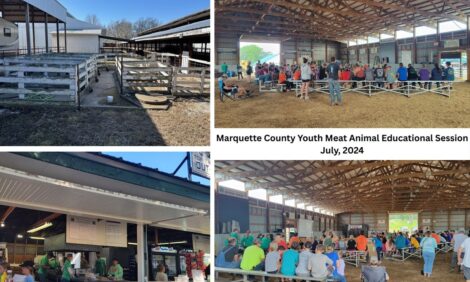



Russia Pushes Domestic Chicken Output
RUSSIA - Poultry farming is being developed rapidly with a view to reducing the country's dependence on imported poultry meat.Russia, its appetite for cheap poultry meat growing, is spending billions of dollars developing its poultry farms to slash its dependence on imports and squeeze US suppliers from their biggest export market, according to Moscow Times.
The expansion could halve the share of imports in Russian poultry consumption by 2012 and push the $55 billion US poultry sector, which sent nearly a quarter of its poultry exports to Russia last year, to seek alternative markets.
Big economies, including Saudi Arabia, Abu Dhabi, United Arab Emirates, China and South Korea, are leading a global search for farmland to guarantee food supplies after rampant food price inflation last year and water shortages drove home the need to reduce dependence on imports.
At the same time, countries are also desperate to protect and expand their own food production with a drive to cut costs figuring high on their agendas in the global economic downturn.
"We are aiming to have 10, maybe 15 per cent of imported meat," said Vladimir Fisinin, president of the Russian Poultry Breeders' Union. This compares with 36 per cent last year.
Viktor Zubkov, one of two first deputies to Prime Minister, Vladimir Putin, has even more ambitious plans. Visiting a turkey farm last month, he forecast that Russia would be self-sufficient in poultry meat and pork by 2012.
Moscow Times reports that the investment is part of Moscow's plan to reduce dependence on poultry, which is gaining in popularity versus more expensive beef.
With jobless rates at an eight-year peak, the government has made it a priority to preserve social order. Self-sufficiency in poultry, analysts say, would create jobs and help ensure that Russia avoids the crises faced by importers when food prices rise.
Russia produced 2.5 million tons of poultry meat last year, or about 64 per cent of what it consumed. This year, it plans to raise combined poultry and pork meat volumes by 550,000 tons, the Agriculture Ministry said on its web site, without providing a breakdown.
The ministry says state banks will this year provide loans of 72 billion rubles (RUB; $2.23 billion) for building new animal and poultry farms and slaughterhouses, plus another RUB 74 billion to complete projects already under way.
These loans, particularly in the economic crisis, will be crucial to the success of Russia's poultry drive.
Two years ago, London-traded Cherkizovo signaled its intent to expand in poultry by acquiring Kurinoye Tsarstvo, which was then Russia's fourth largest poultry firm.
"We plan the substantial development of our poultry units in Bryansk and Penza, which could lead to a serious increase in output at these two units in 2010-2011," said Irina Ostryakova, spokeswoman for Cherkizovo, Russia's biggest poultry firm.
"But the implementation of these plans will directly depend on the bank loans we will be able to raise," she added.
Privately owned Eurodon is another firm at the forefront of Russia's push toward self-sufficiency, according to Moscow Times. Backed by over $200 million in state loans, it already produces one-third of Russia's turkey meat at farms near Rostov-on-Don in the country's south.
State bank VEB supplied $60 million to help Eurodon launch its complex five years ago. The project covers 100 hectares, and its 11 farms are located 25 kilometres from each other, a precautionary measure to prevent the spread of disease.
Eurodon has plans for an eightfold increase in production capacity, said Sergei Konovalov, adviser to founder and chief executive, Vadim Vaneyev.
"We want to have a full production cycle, from our own breeding flock and hatching eggs through to products ready for consumption," he said.
Today, Eurodon employs 650 people in a region once known for its coal mines, many of which closed when the Soviet Union collapsed. "After all our strategic projects are implemented, we may employ 10,000," Mr Konovalov said.
Russia's government intends to cut import tariff quotas for the next three years in accordance with the volumes by which it increases its own meat output. Moscow has already cut its 2009 poultry quota by 24 per cent to 952,000 tons.
But achieving Deputy Prime Minister Zubkov's target of self-sufficiency will also depend on market conditions. Domestic production must be more attractive to consumers than imported meat, analysts said.
Dmitry Rylko, general director of the Institute for Agricultural Market Studies, said Russia would first need to cut the "vicious price circle" that governs its poultry sector.
"We restrict imports by tariff quotas, which pushes domestic prices up and cuts demand. This in its turn stimulates imports above the quota, which become more attractive," he said. "The only way out is to learn how to produce competitive, quality meat," he told Moscow Times.








